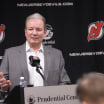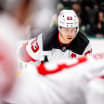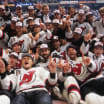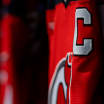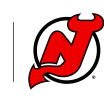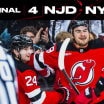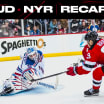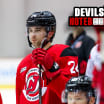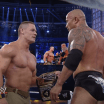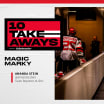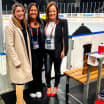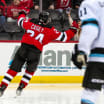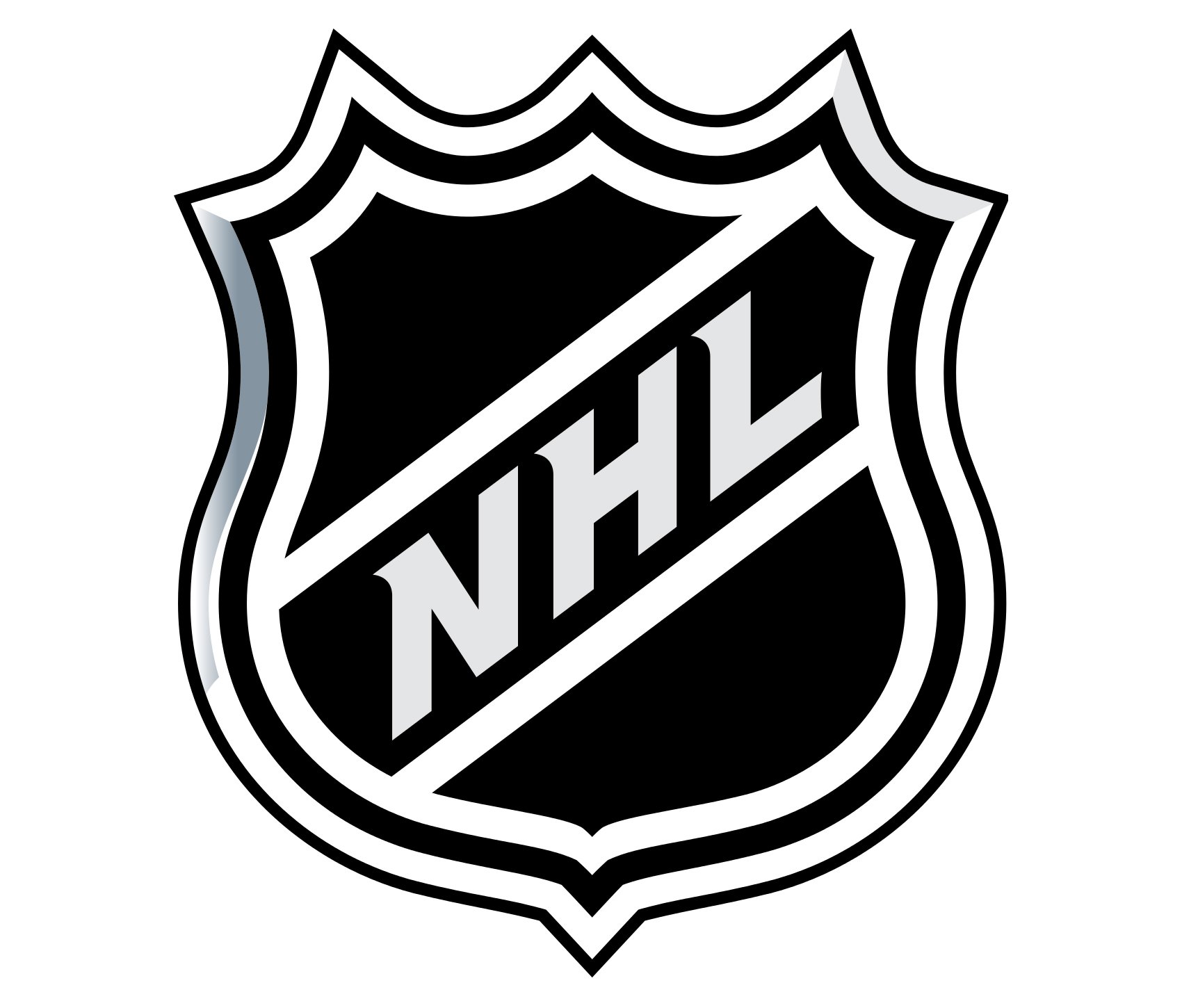It just didn't seem right.
After the New Jersey Devils had captured their second Stanley Cup in 2000 all signs indicated they had the goods to do it again -- and again.
But they didn't.
Unfortunately, in 2001, the Colorado Avalanche got in the way, defeating Our Heroes in seven games. (We had a three games to two lead.)
"The Avs were a team of destiny," said super-goalie Martin Brodeur. "We had our chance, but Colorado made the most of its opportunities and that was that."
FISCHLER: 2003 Devils Stanley Cup Special
Stan Fischler looks back at the Devils 2003 Stanley Cup run and victory
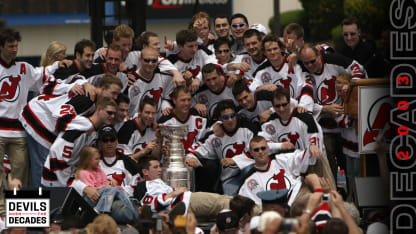
By
Stan Fischler
Special to NHL.com
A year later, New Jersey finished just two points behind division-leading Philadelphia in the Atlantic race, but failed in a quest for the Final.
"We still believed in ourselves," insisted defenseman Ken Daneyko. "Check the lineup and you'll find we were strong in every area. There still was another Cup in our future."
Entering the 2002-2003 season, the Devils lineup supported Ken's conclusion to the hilt. With future Hall of Famers Scott Stevens and Scott Niedermayer backing a career-peaking Brodeur, coach Pat Burns was gifted with depth.
"Our offense was as good as our last Cup season," added Scott Gomez, Calder Trophy rookie of the year in 2000 when New Jersey annexed its second Cup.

Video Player is loading.
Current Time 0:00
/
Duration 0:00
Loaded: 0%
0:00
Stream Type LIVE
Remaining Time -0:00
1x
- Chapters
- descriptions off, selected
- captions settings, opens captions settings dialog
- captions off, selected
This is a modal window.
Beginning of dialog window. Escape will cancel and close the window.
End of dialog window.
This is a modal window. This modal can be closed by pressing the Escape key or activating the close button.
Friesen's Goal | 2003 STANLEY CUP MEMORIES
After the regular season ice had been cleared in April 2003 the Garden Staters finished atop the Atlantic Division with 108 points only five below league leading Ottawa.
"We may not have had any of our guys in the top ten scorers," Burns explained. " What we had was balance. It turned into an advantage in the long run. Add to that, was our leadership and not only our captain, Scott Stevens."
En route to the Devils second Stanley Cup title, Stevens won the Conn Smythe Trophy as playoffs MVP. An offensive force when he came to East Rutherford in 1993, Scott modified his forays and became the prototypical defensive bulwark.
"In doing so," wrote legendary Devils beat writer Rich Chere, "Stevens changed the course of Devils history."
The road to a third Stanley Cup may not have been Turnpike-smooth in New Jersey's 21st season of NHL competition but it was -- all things considered -- a marvelous marathon.
"We put up good points," said Patrick Elias who led the team in goals (28) and points (57), "and showed stability from the get-go."
The getting and going was evident once Burns' boys galloped from the starting gate. On November 15, 2002, they ventured to Montreal and beat the Canadiens, 5-1. Their record was an admirable 10-4-0.

Video Player is loading.
Current Time 0:00
/
Duration 0:00
Loaded: 0%
0:00
Stream Type LIVE
Remaining Time -0:00
1x
- Chapters
- descriptions off, selected
- captions settings, opens captions settings dialog
- captions off, selected
This is a modal window.
Beginning of dialog window. Escape will cancel and close the window.
End of dialog window.
This is a modal window. This modal can be closed by pressing the Escape key or activating the close button.
Rupp's Winner | 2003 STANLEY CUP MEMORIES
Apart from the Gibraltar-like defense, and Brodeur's China Wall goaltending, Burns boasted strength down the middle. His most consistent playmaker was Scott Gomez who would wind up as team assist leader with 42 helpers.
"We knew we were playoff-bound," said Gomez, Alaska's gift to big-league hockey. "It all came down to how well we'd play in the second half."
The new year (2003) was good to the Garden Staters. From January 7 through February 5th, they savored a 15-game undefeated streak.
At the very top of his game, Brodeur produced 41 victories out of the team total of 46. As a team, the Devils tied Philadelphia for fewest goals allowed (166) and glowed on the penalty kill with an NHL best 87.88 per cent average.
John Madden and Jay Pandolfo ranked among the best PK-meisters in recent memory. The versatile Madden -- a surprise discovery when New Jersey obtained him -- had a better scoring touch than anyone imagined.
"Even when we were a man short, Johnny was a threat to score against the other guys," Burns enthused. "Jay was as good a defensive forward as I ever had."
To the credit of the Boss, Lou Lamoriello, his roster was galvanized by the erstwhile "No-Names" who arrived at camp in September 1999.
Madden, of course, was one, Gomez another and the least-known of all was defenseman Brian Rafalski who had been virtually hidden from NHL view while excelling in Europe. By 2003, Rafalski had become a genuine star.
"Teaming up on the blue line with Scott Stevens, Rafy helped the captain play an even better game than he had before," remembered Glenn (Chico) Resch, the Devils radio analyst. "Brian may not have been that big but he was strong."
Arguably the best testament to Rafalski's versatility is the fact that he balanced his defensive prowess with offense. The blend enabled him to lead all New Jersey defensemen in scoring with 40 points.

Video Player is loading.
Current Time 0:00
/
Duration 0:00
Loaded: 0%
0:00
Stream Type LIVE
Remaining Time -0:00
1x
- Chapters
- descriptions off, selected
- captions settings, opens captions settings dialog
- captions off, selected
This is a modal window.
Beginning of dialog window. Escape will cancel and close the window.
End of dialog window.
This is a modal window. This modal can be closed by pressing the Escape key or activating the close button.
Stevens on Team Depth | 2003 STANLEY CUP MEMORIES
Not that Brian needed another bonus but his arrestingly low penalty count -- only 14 minutes total -- added to his positive utility among the blue liners.
Meanwhile, Rafalski's blue line colleague, Scott Niedermayer, was displaying the brand of 200-foot hockey that eventually would gain the British Columbia native entrance in the Hockey Hall of Fame.
Nieder's eleven goals paced all defensemen while his 39 points was only one behind Rafalski's. As an added fillip, Nieder tied forward Jeff Friesen for best-plus-minus on the team with a season-ending Plus-23.
"Nieder was only a year away from winning the Norris Trophy," Ken Daneyko recalled, "but he already was right up there with the best; stars such as Nik Lidstrom, Al MacInnis and Chris Chelios and our own Scotty Stevens."
New Jersey's sum total was first place in the Atlantic Division and second best point total of 30 teams. Along with the Ottawa Senators, the Devils were one of the two elite teams in the NHL.
"Naturally we all felt good about what was accomplished," said coach Burns. "Now let's see what we can do in the 'Second Season.' The playoffs are a whole different ball game."
First on the Lamoriello-Burns agenda was a solid Boston Bruins outfit which finished third in the Northeast Division. The Beantowners 87 points fell 21 below that of their foes.
"We're in a good 'spoiler' position" said Bruins head coach Mike Sullivan. "But we respect what the Devils bring to the ice."
The tournament opened on April 9th at Continental Airlines Arena and what the home team brought with them was clutch scoring and a Vezina Trophy-winner in the crease.
Goals in the first period and second periods by oft-underrated Jamie Langenbrunner was all goalie Martin Brodeur needed despite a late score by Boston defender Bryan Berard. Devils 2, Bruins 1.
Not to be overlooked was the scoring depth. Jeff Friesen and Patrik Elias assisted on the opening goal while Joe Nieuwendyk got the helper on Jamie's game-winner. Each of the aforementioned would excel in future playoff games.
New Jersey captured the next pair of contests, 4-2 and 3-0 for a commanding lead that just about sent the Bruins into hibernation.
Game Four was Boston's only game of distinction. Knocking Brodeur out of the box for a 5-1 advantage, the B's enjoyed what evolved into a pyrrhic victory. On April 17, Marty returned to form and the Devlls took the series with a 3-0 win.
"Marty was flawless," critiqued captain Stevens.
Madden: "Marty's been through this before. He's mentally stable and that's why he's the top goalie in the NHL."
Noteworthy as well was Madden's goal and the two assists he received on Langenbrunner's pair of red lights.
After a brief respite the Devils next were challenged by the Southeast Division champion Tampa Bay Lightning. Coached by irascible John (Torts) Tortorella, the Bolts finished the campaign with 93 points 15 behind New Jersey.
"Torts teams are always tough," warned Burns. "Especially with scorers like Vince Lecavalier and Marty St.Louis. We have to be sharp defending against those shooters."
No problem. In Game One on April 24th at Continental Airlines Arena, Brodeur was at the top of his game and so were his checkers. Lecavalier and St.Louis felt as if they were hermetically sealed as the home club romped 3-0.
"We'll be better in Game Two," Tortorella warned. "There's more to our game than we showed in the opener."
That there was and, as a result, Game Two not only was a major challenge for Burns' Bombers but came those to being a disaster for the favorites.
The Bolts carried a 2-1 lead through two periods behind Nikolai Khabibulin's superb goaltending but the Devils managed to find a new hero as their savior -- fouth-liner Grant Marshall.
Feisty and funny, Marsh was one of those precious few who lie in the bushes like a panther and then, suddenly spring forward to do the necessary damage.
With 9:34 remaining in the third period and the East Rutherford crowd chewing off its fingers in anxiety, the doughty Marshall beat Khabibulin and catapulted New Jersey into an overtime thriller.
Earlier heroes were at it again. With just over two minutes gone in the first sudden death frame, Madden skimmed a pass to Langenbrunner who fired the rubber at a hoped for opening.
"It wasn't that good a shot," Jamie insisted, "but it hit their goalie high enough that it was hard for him to control and then he gave me a juicy rebound."
Langenbrunner beat Lecavalier to the loose buscuit and put it over the goal line at 2:09 for the game-winner. It marked Jamie's seventh goal in seven post-season games.
Stevens: "The 'secret' with Jamie is no secret at all. He never stops working and comes to play every night. He competes with tremendous energy, and that's what winning in the playoffs is all about."
The value of Langenbrunner's goal cannot be underestimated particularly since the Bolts rebounded with a 4-3 win in Game Three. Nonplussed, New Jersey regained form in Game Four thanks to Scott Gomez's goal and assist in a 3-1 triumph.
Without question, Game five on May 2, 2003 will forever be etched in Devils annals as one of the most thrilling of all-time. Three overtimes worth!
After regulation time, the clubs were knotted at 1-1 after which the SRO crowd was gifted with an arresting goaltending duel between Brodeur and Tampa Bay's John Grahame who unexpectedly replaced Khabibulin.
Matching Marty save for save, the Bolts back-up kept his team's playoff hopes alive until just past the eleven-minute mark of the third extra session. By this time Grahame had registered 46 saves.
But the Devils persisted, penetrating the Lightning perimeter. Scott Niedermayer took a shot from above the right circle at a convention in front of the Visitors' crease. Grant Marshall happened to be one of the happy campers.
"The puck landed in front of me," Marshall recounted, "and I just kept whacking at it. I finally found an opening in the five-hole and banged it in."
For Marshall, this completed a delicious set of ironies. First, he almost missed the team bus when it departed the team's hotel for the arena. Secondly, during the intermission between the second and third overtimes, Grant had a vision.
"Although I never was known for my scoring. I kept thinking about how great it would be if I got the game-winner. And then it happened!"
The melodramatic victory thrust New Jersey into the third round. This was serious stuff. Ottawa had finished first overall with 113 points, five more than New Jersey. The Senators would have home ice for the first pair of games.
It was close-but-no-cigar for Burns Boys; a 3-2 loss on May 10, 2003 but the Devils resiliency surfaced in Game Two, a convincing 4-1 victory. Jay Pandolfo -- without sacrificing his defensive prowess -- registered a goal and an assist.
Without a weak spot in his lineup, Burns found that, more and more, Jeff Friesen, was surfacing as a regular clutch performer. He delivered the game-winner to tie the series.
Energized by their return to East Rutherford, the Devils moved into a three-games to one series lead.
Marty Brodeur pitched a 1-0 shutout and the hero of Cup's past, little Sergei Brylin fired home the one and only goal.
"If you look back at players I've had right back to the first Cup win in '95." Lamoriello chuckled, "Sergei has never failed us."
Game Five pushed Ottawa to the precipice, New Jersey's 5-2 advantage seemed to deflate the regular season champs. On the other hand, it also may have given the Devils a sense of false security.
Whatever the reasons, Brodeur & Company lost two in succession -- 3-1 at Ottawa and 2-1 in East Rutherford. Thus, it all came down to a Game Seven at the Senators arena in distant Kanata, Ontario.
Jeff Friesen: "We weren't disappointed playing in a seventh game. Hey, it came down to a one-game series and a team we were playing was an unbelievable hockey club. But we were ready, willing and able."
Not at first. Ottawa scored in the first period and nursed the one-goal lead until the second period when Jamie Langenbrunner scored twice in a period of 1:54.
But the Senators rebounded in the third.
A turnover by Friesen led to Ottawa's tying goal by Radek Bonk. From that point on -- past the fifteen-minute mark -- overtime seemed imminent.
Well, almost imminent.
Never to win a prize for his playmaking abilities, Grant Marshall nonetheless had his radar in rare shape and spotted a Devils jersey in scoring position. It was Friesen and he was unguarded and eager to see a puck.
"I saw Jeff," Marshall recalled, "but (Ottawa defenseman) Wade Redden was blocking him from me. I took a gamble and passed the puck through Redden's legs."
The connection was so microscopic-perfect that Friesen, alone in front of goalie Lalime, easily found air and illuminated the concluding red light of the game. Final Score: New Jersey 3, Ottawa 2. Devils win the series in seven games!
"I sure didn't want to be the goat with my turnover early in the third," said Friesen. "I guess my game-winner made up for that."
Yeah, that and Jeff's total of three game-winners out of the Devils four victories. Not a bad clutch average.
"We got to where we wanted to be," said captain Stevens. "Now we go for all the marbles."
Then again, so were the Mighty Ducks of Anaheim who reached the Cup Final for the first time in franchise history. Having finished second in the Pacific Division, the Ducks totaled 95 points, 13 less than New Jersey.
"We didn't get to the Final by accident," snapped Ducks coach Mike Babcock. "And we're not going to stop winning either."
Fortified with the likes of hot goalie Jean-Sebastien Giguere, super-sniper Paul Kariya and Scott Niedermayer's solid kid brother, Rob, the Ducks were in the Final because they were formidable. No pushovers, they!
One press box wag labelled the roller coaster Final as "The Pendulum Series." It went back and forth with home teams winning every game.
Opening at Continental Airlines Arena, the Devils posted identical 3-0 victories. Sergei Brylin got the winner in the curtain-raiser with Patrik Elias doing likewise in Game Two.
Marty Brodeur was his typically flawless self -- until he arrived at Arrowhead Pond in Anaheim for Game Three. What fans, media -- everybody -- saw produced double and triple-takes.
Stunningly -- call it overconfidence, call it accidental -- Brodeur committed an egregious sin in the crease. With the third game tied 1-1 and his club playing with its usual confidence, all that good stuff disappeared.
Anaheim had moved the rubber into the New Jersey zone and toward the crease. Stopping the puck should have been a yawner. Marty's kid cousin could have saved it.
But inexplicably Brodeur accidentally dropped his stick and, BINGO! The puck deflected off the fallen object and, stunningly, into the net. Even to seasoned hands in the press box, the goal seemed inexplicable.
"It was just one of those once in a lifetime things," the goaltender later explained.
Fair enough; and the Devils did force overtime but lost in the sudden-death period as they did again in Game Four, a 1-0 decision for Babcock's sextet.
Ah, but the pendulum swung back to East Rutherford for Game Five and, this time, the Devils got a break. With the score tied 3-3, a Jay Pandolfo goal was waved off on the grounds that J.P. had "kicked" the biscuit past Giguere.
Whoops! Wait just a minute. Upon further review, the NHL sleuths ruled that the ref was in error. THE GOAL COUNTED! New Jersey took the lead and never relinquished it. Plus, the Burns Brigade now led three games to two.
So, it was back to Anaheim and if the Devils gained anything out of Game Six iti was a classic Scott Stevens bodycheck that smashed Paul Kariya to the ice. A few media types called it "one of the hardest hits in Cup Final history."
Carried to the infirmary, Kariya appeared over and done with but nobody bothered to mention that to Paul. Within a dozen minutes he returned to the ice and slapped a puck past Brodeur leading his lads to a 5-2 victory.
Thus, this unlikely saga came down to Game Seven on June 9, 2003 at the Meadowlands with heroes emerging from the woodwork via a script no Hollywood fiction-writer could imagine.
For starters there was what one could call "The Swan Song of Ken Daneyko."
Benched by Burns for the first six games, the vet D-man was told that, at last, he was in the lineup. In Matthew Blittner's book, "Unforgettable NJ Devils," Daneyko explained how mixed his emotions were when he got the green light.
Daneyko: "I was getting older and getting into Game Seven was memorable for me. It was my last game and what a way to go out. It was a storybook ending for me. But it was also a scary looking picture. We had to win!"
By contrast there was "The Tale Of The Unknown Rookie." Little was known of tall Mike Rupp, out of Cleveland, Ohio. He was a center; as green as they came but Burns decided to gamble on him at pivot.
Then there was a matter of beating "The Law of Averages." Entering the contest with an 11-1 record of home victories, The LOA was working against New Jersey.
But not against Rupp. Playing in only his fourth post-season game -- all in the Final round -- the rookie still found it un-real that Burns showed so much faith in his competency.
"Before the final round," Rupp asserted "I wouldn't have thought I'd ever see action. And then I wind up in Game Seven."
It proved a Lucky Seven.
Early in the second period when a Scott Niedermayer shot from the blue line was tipped by Mike past Giguere at 2:22. It put the home team ahead and the onus now was on Brodeur to maintain the advantage; which he did.
Rupp obliged a bit later; once more on an almost identical play: Nieder took the shot, Rupp deflected it again but this time Giguere made the save but permitted a rebound.
Friesen said to himself, "Thank you very much!" And scored the game's second goal.
From that point on, Brodeur erected a moat in front of his net and -- just to make sure -- Friesen scored his tenth playoff goal and the Devils sailed to their third Stanley Cup with a most convincing 3-0 blanket job.
Or, as Rich Chere wrote in the Star-Ledger: "Once again Exit 16W stands for 16 wins."
If there was any imperfection in the script, It was recorded after the final buzzer when the revelation was made that Giguere -- not the most-deserving Brodeur -- won the Conn Smythe Trophy as playoffs MVP.
That was a stunner, to be sure, But, as often was the case, Marty had the perfect squelch -- or best punch line, if you will.
After lifting Lord Stanley's mug before the adoring, tumultuous crowd, Brodeur explained what matters most in hockey and what does not matter:
"I have the Stanley Cup," Marvelous Marty concluded. "It's my third one. I don't really care about the Conn Smythe!"
As the curtain descended on this Devils passion play, perhaps Ken Daneyko's farewell was the most pointed and most poignant of all since he was bidding adieu to his long playing career.
Daneyko: "I just wanted to win. I wanted to absorb it, take it all in and then say good-bye. In the end, it all worked out because it's all about winning."
Then, a pause and a grin: "And we won!"

